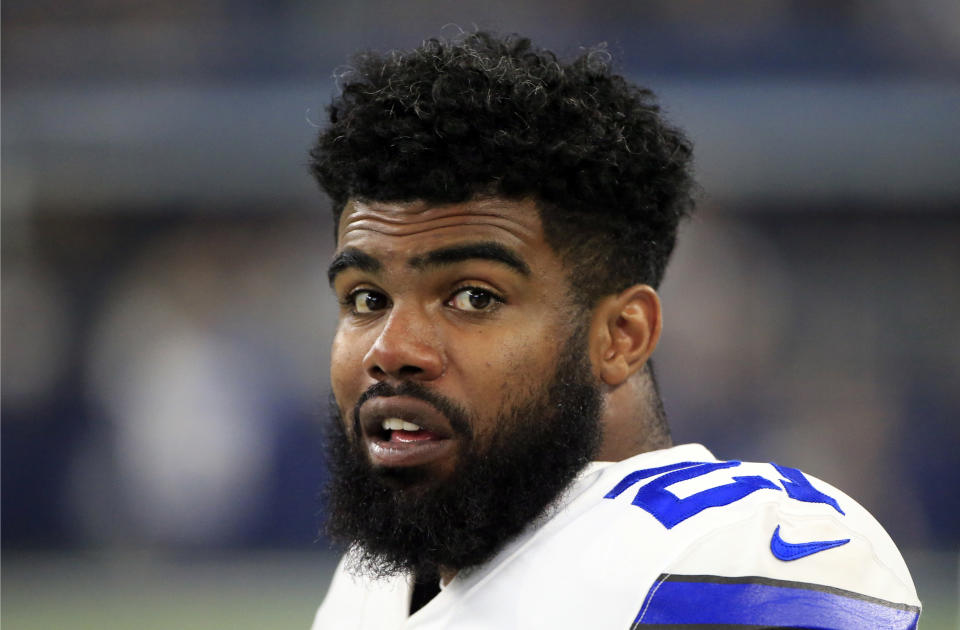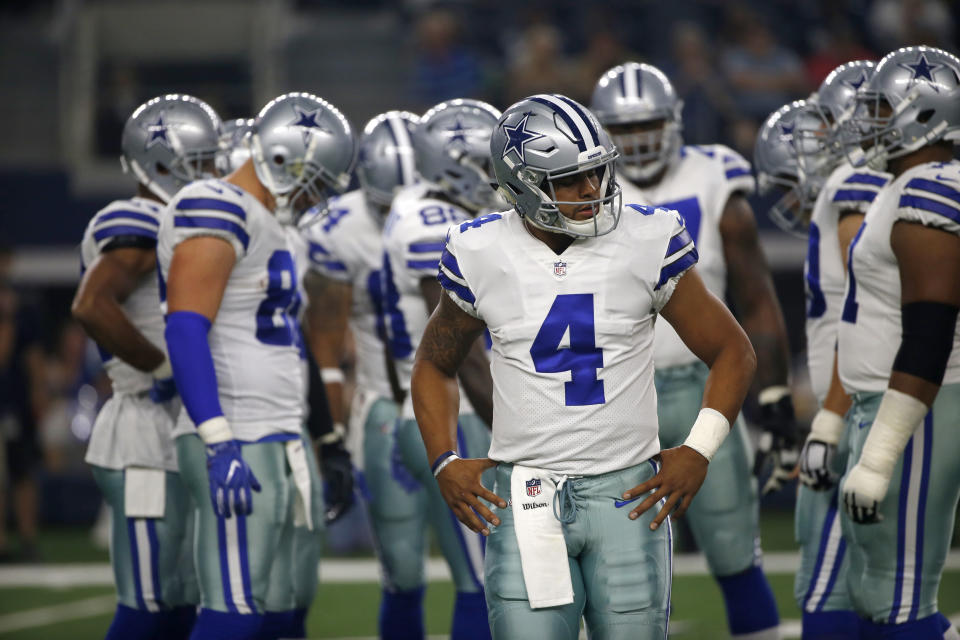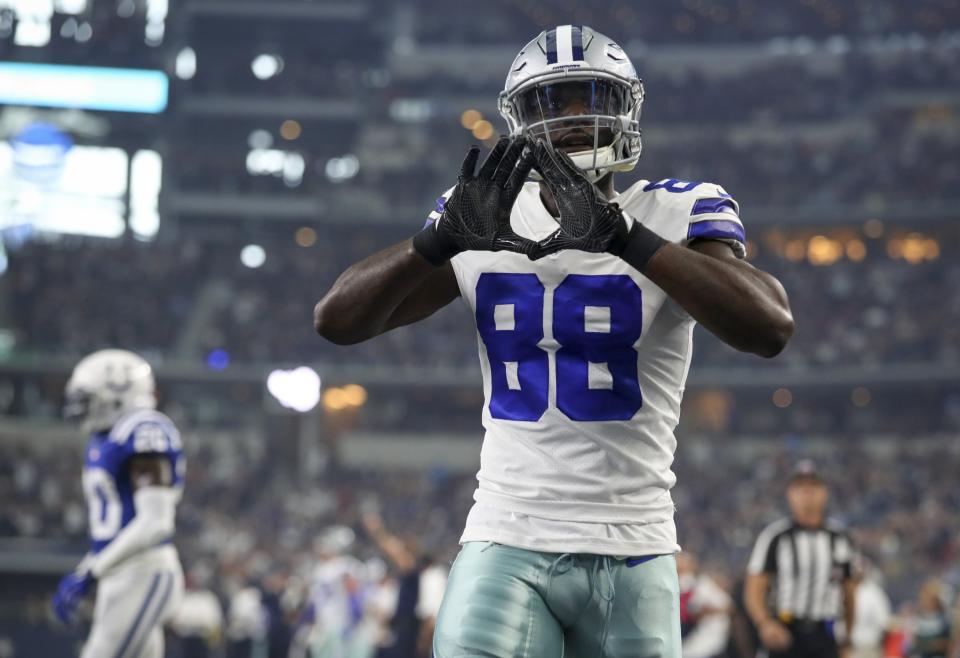Juggernaut Index, No. 4: Ezekiel Elliott dilemma one of several Dallas storylines

As with most conduct-related punishments in the NFL, the announcement of Ezekiel Elliott’s six-game suspension in August was just the beginning of a protracted period of ugly public back-and-forth between league and player. Elliott’s suspension was the result of multiple incidents. It’s a story far too sordid and complex to summarize in a fantasy team preview, so, if you need details, I’ll direct you to this archive, containing detailed reporting.
[Now’s the time to sign up for Fantasy Football! Join for free]
Fantasy analysis is obviously the smallest, least significant angle on a story that impacts many lives, and that will shape the nature of league discipline moving forward. But here we are. Longtime fantasy owners understand that when we draft players, we’re really only investing in the sets of statistics associated with those players. We’re playing a numbers game. No deeper relationship exists. It feels wrong to reduce certain stories to fantasy spin, but, well … people are out there drafting teams. Elliott was the league’s leading rusher last season. There’s a fantasy conversation to be had.
With that in mind, let’s consider the range of possible on-field outcomes for Elliott in the season ahead. As of this writing, the suspension appeal process is ongoing. Even when a decision is handed down (probably on Monday), there’s a very good chance this story will not be finished. Elliott’s punishment could be upheld, reduced or erased. He can choose to accept or contest the arbitrator’s decision. It’s not at all clear that Elliott will actually be sidelined in opening week. Everything remains on the table, including a lengthy legal fight.
Let’s simply consider the worst-case scenario from the perspective of a fantasy owner who drafts Elliott: You’ll need to find a six-week replacement RB, but Zeke will presumably be available to you in December, when fantasy titles are won and lost. Last season, he averaged 133 scrimmage yards and one touchdown per week. He is, without question, a fantasy difference-maker of the highest order. Dallas’ offensive line took a few minor hits in the offseason, but the unit still figures to be one of the league’s best.
The key to drafting Elliott and successfully navigating the regular season is to enter your draft planning to cover a prolonged absence. This isn’t particularly difficult in standard-size leagues — let’s say 8-12 teams with the usual starting positions — but it becomes much more challenging in deep formats. (On Sunday night, I had the fourteenth pick in a 20-team draft. When Elliott remained on the board through the first nine picks, I began to get the Zeke sweats. Someone eventually pulled the trigger before he fell to me, however. I felt mostly relief, but maybe a twinge of regret.)
The Cowboys are planning to rely on Darren McFadden as their primary back during Elliott’s suspension, and he’s certainly a reasonable fantasy option while occupying a featured role. He’s nowhere near Elliott’s class as a runner, certainly, but he’ll work behind a quality line in a productive offense. Alfred Morris actually had a more impressive preseason, but he doesn’t have McFadden’s all-situation skill set. Morris is merely a handcuff to a handcuff, not obviously worth owning.
Ultimately, your willingness to roster Elliott is a reflection of your risk tolerance. It’s a big gamble, no doubt. If you’re in on Zeke, then you’re probably out on an early-round QB or TE, because you’ll need to roster one more running back than would be necessary under normal circumstances. But again, Elliott is the rare back who’s worth all the management headaches. He’s the kind of fantasy asset who can decide league championships. I have a Labor Day draft upcoming, and I’ll be eying him near the turn.

Should we expect a sophomore slump from Dak Prescott?
Prescott had a ridiculously efficient rookie season, embarrassing the many scouts who rated him well behind Goff, Wentz and various other passers in his draft class. He was tremendous. Prescott averaged 8.0 yards per attempt and completed 67.8 percent of his throws, finishing with 23 touchdown passes and just four interceptions. Those are insane numbers from any quarterback, and almost unprecedented from a rookie. He was a low-volume passer (459 attempts), but he made up for that small issue by rushing for six scores.
It seems unwise to predict a follow-up season for Dak that matches 2016 in terms of efficiency, but it also seems as if the team will ask more from him in his second year. Prescott’s rushing talent provides a safety net, fantasy-wise, and he enters the year with a healthy Dez Bryant at his disposal. That’s no small detail. Expect his pass volume to increase, along with his TD potential.
For me, the only significant worry with Prescott (and with the Dallas offense generally) is this team’s early-season schedule. The Cowboys open with a home game against the Giants, and then they travel to Denver and Arizona before hosting the Rams in Week 4. All four of those defenses finished among the league’s top-10 last season. Dallas will also host Seattle in Week 16, the most important date on the fantasy calendar, so that’s less than ideal.
Still, we have to accept that Dak’s terrific rookie season was no fluke. He has a path to QB1 status, and the middle weeks of his schedule are full of appealing matchups. He’s had a fantastic preseason, too. Draft and start him with confidence.
Are we buying a Dez Bryant bounce-back?
I’m with Player Profiler’s Matt Kelley on this one: Dez is good. Dez is back, healthy and ready to return to vintage form. Let’s recall from 2012 to 2015, Bryant averaged 91 receptions, 1312 yards and 14 touchdowns per season. He’s healthy and coming off a productive offseason with Prescott. I’m in — actually, I’ve been in since Bryant delivered that 9-catch, 132-yard, 2-TD playoff performance against the Packers. I’ll take all the shares I can get. Bryant is still just 28, not yet past his prime years. He shouldn’t last beyond the mid-second round in standard drafts.
[Pick one winner a week. Play Survival Football for chance at $100K]
Bryant’s early schedule is clearly a minefield, but he’s matchup-proof when he’s right.

Beyond Dez, we find the usual suspects in Dallas’ receiving corps: Cole Beasley, Terrance Williams, Brice Butler and Jason Witten. Of those four, Beasley and Witten are the guys worth considering for fantasy purposes, and both are locks to deliver useful PPR stat lines. Beasley produced career highs in all meaningful areas last season, catching 75 passes for 833 yards and five scores. Witten hasn’t missed a game since like 1977, and, if he chooses, will be producing 65-600-4 fantasy lines when he’s a 70-year-old man. It’s honestly hard to imagine the NFL without Witten. He’ll find a path to PPR value, no doubt, but we should note that he’s only topped five touchdowns once in the past six years. Tight end Rico Gathers is an interesting dynasty option long term, but Witten may never retire.
The Cowboys D is strictly for streamers.
Dallas’s defense didn’t do anything special last year, ranking middle-of-the-pack in yards allowed (343.9 YPG), sacks (36) and takeaways (20). Sean Lee is an IDP of interest, coming off a huge season (145 tackles). This D/ST is a non-terrible option in the opener against Eli Manning, but it’s not a defense that needs to be owned from beginning to end. Add and drop as needed.
2016 Offensive Stats & Ranks
Points per game – 26.3 (5)
Pass YPG – 226.9 (23)
Rush YPG – 149.8 (2)
Yards per play – 6.0 (4)
Plays per game – 63.2 (19)
—
Previous Juggernaut Index entries: 32) NY Jets, 31) San Francisco, 30) Cleveland, 29) LA Rams, 28) Baltimore, 27) Chicago, 26) Minnesota, 25) Detroit, 24) Denver, 23) Jacksonville, 22) Buffalo, 21) Philadelphia, 20) Miami, 19) Indianapolis, 18) Kansas City, 17) Washington, 16) NY Giants, 15) Tennessee, 14) LA Chargers, 13) Carolina, 12) Houston, 11) Arizona, 10) Oakland, 9) Tampa Bay, 8) Cincinnati, 7) New Orleans, 6) New England, 5) Seattle, 4) Dallas


